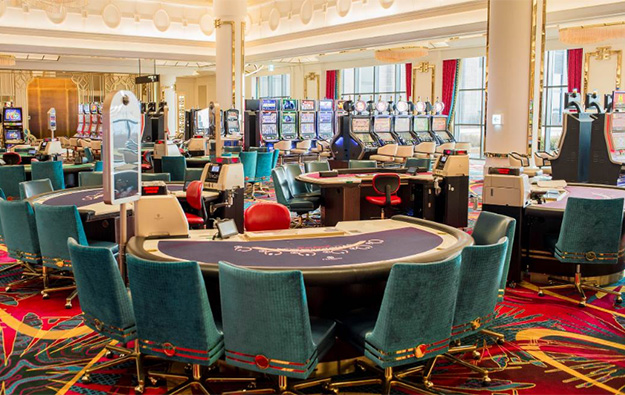71pct dip in visits to S. Korea casinos in 2020 says govt
May 06, 2021 Newsdesk Latest News, Rest of Asia, Top of the deck

Gambling cash turnover in South Korea’s casino market for full-year 2020 fell by 64.5 percent from the prior-year period, according to data from the Ministry of Culture, Sports and Tourism, issued through its official website on Tuesday.
The fall coincided with a 71.3 percent decline year-on-year in the aggregate of visits to the properties: i.e., foreigner-only venues and the Kangwon Land resort, the only casino complex in the nation that is permitted to offer bets to locals.
The deterioration in attendance occurred at a time when the impact of the Covid-19 pandemic was felt on inbound tourism to South Korea and on the country’s casino operations, including capacity limitations and in some cases periods of temporary closure as a Covid-19 countermeasure.
South Korea’s 2020 casino gambling turnover was KRW1.04 trillion (US$926.53 million), compared to just under KRW2.93 trillion in 2019, according to the figures. The ministry’s data also indicated that the number of visits to South Korea’s casinos stood at 1,760,232 in 2020, compared to a tally of 6,128,952 visits in 2019.
The 2020 casino turnover for the country’s 16 foreigner-only casinos recorded a 58.8-percent decline, to KRW597.8 billion, from KRW1.45 trillion in 2019, according to the data.
The Korea Casino Association, an industry trade body, had released its own aggregated 2020 data in February, indicating that 2020 casino turnover for foreigner-only venues was KRW595.4 billion.
Grand Korea Leisure Co Ltd (GKL), one operator in South Korea of foreigner-only casinos, saw its gambling sales fall 62.3 percent year-on-year in calendar-year 2020, from KRW493.1 billion to KRW186.0 billion, according to the ministry’s accumulated data.
Paradise Co Ltd, another group with gambling venues serving only foreigners, saw accumulated sales for full-year 2020 down 57.3 percent, according to the ministry data. Such sales slipped from KRW784.92 billion in 2019, to KRW335.48 billion last year.
Ministry data indicated Kangwon Land Inc, operator of the Kangwon Land resort, saw its gambling sales revenue fall 70.0 percent year-on-year, to KRW443.5 billion, from KRW1.48 trillion.
Due to Covid-19 countermeasures, all South Korean casinos have faced capacity limitations – and for some, periods of temporary closure – since the effects of the pandemic began to be felt in the country early in 2020.
During 2020, South Korea saw an 85.6-percent decline year-on-year in the aggregate of foreign visitors to the country, to 2,519,118, from 17,502,756 in 2019.
The ministry’s data also indicated the 2020 amount collected for the “Tourism Promotion and Development Fund” as KRW97.68 billion. A mandatory contribution to the fund is levied on the whole casino industry. In 2020, such contribution was calculated at within 10 percent of the industry’s total gambling sales revenue.
But according to media reports in South Korea, the Ministry has permitted the industry – after lobbying by it – to delay until next year the payment due for 2020.
In 2019, the industry’s mandatory payment towards the fund was KRW284.85 billion.
GGRAsia approached on Thursday the Ministry of Culture, Sports and Tourism, for clarification on the method it uses to levy contributions from casino businesses for the Tourism Promotion and Development Fund.
It told us that for casino businesses with annual sales revenue under KRW1 billion, the levy was set at 1 percent of such revenue.
Those operations with sales revenue of between KRW1 billion up to KRW10 billion, were required to pay 5 percent.
Casino businesses with annual sales revenue over KRW10 billion, were mandated to pay 10 percent to the tourism promotion fund, the ministry added.
Related articles
-
 Kangwon Land 2Q net profit up 64pct...
Kangwon Land 2Q net profit up 64pct...Jul 19, 2024
-
 S.Korea’s Paradise Co June gaming...
S.Korea’s Paradise Co June gaming...Jul 03, 2024
More news
-
 Donaco EBITDA up y-o-y to above US$4mln...
Donaco EBITDA up y-o-y to above US$4mln...Jul 26, 2024
-
 HK listed Palasino upgrades Czech...
HK listed Palasino upgrades Czech...Jul 26, 2024
Latest News
Jul 26, 2024
Border-casino operator Donaco International Ltd has achieved a 164.17-percent year-on-year increase in its latest quarterly group earnings before interest, taxation, depreciation and amortisation...Sign up to our FREE Newsletter
 (Click here for more)
(Click here for more)
Pick of the Day
”We’ve got more traction outside of Macau at the moment. But Macau’s going be a bigger focus for us”
David Punter
Regional representative at Konami Australia
Most Popular
 Sheraton brand to exit Londoner Macao, to be Londoner Grand July 25, 2024
Sheraton brand to exit Londoner Macao, to be Londoner Grand July 25, 2024  Macau regulator probes unlicensed gaming agents July 24, 2024
Macau regulator probes unlicensed gaming agents July 24, 2024  Philippines gives 20k aliens in POGOs 60 days to leave July 25, 2024
Philippines gives 20k aliens in POGOs 60 days to leave July 25, 2024  Philippines-listed DigiPlus says not affected by POGO ban July 24, 2024
Philippines-listed DigiPlus says not affected by POGO ban July 24, 2024  Sands China 2Q EBITDA down q-o-q amid low hold, renovation July 25, 2024
Sands China 2Q EBITDA down q-o-q amid low hold, renovation July 25, 2024






